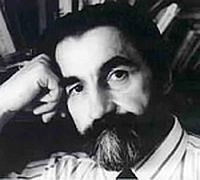- Igor Smirnov (scientist)
-
This article is about the scientist. For the politician, see Igor Smirnov.
Igor Viktorovich Smirnov 
Born April 5, 1951
Moscow, RussiaDied Nov 5, 2004 Occupation Scientist / Researcher Igor Viktorovich Smirnov (Russian: Смирнов, Игорь Викторович) (April 5, 1951 – Nov 5, 2004) was a controversial Russian scientist best known for his role in Soviet-era mind control research as well as an obscure field of human behavior study he called "psychoecology".[1]
Contents
Career
Smirnov has been characterized in the media as a Rasputin-like character with "almost mystical powers of persuasion". According to his wife Rusalkina, the Soviet military enlisted Smirnov's psychotechnology in the 1980s to combat the Mujahideen and treat post-traumatic stress syndrome in Russian soldiers during the war in Afghanistan. After the dissolution of the Soviet Union, Smirnov transitioned from military research to the treatment of patients with drug addiction and mental problems. He founded the Psychotechnology Research Institute at the Peoples' Friendship University of Russia to work on ideas like "psychocorrection", a term he used to denote the use of subliminal messages to alter a subject's will, or even modify a person's personality without their knowledge.[1]
Struggling to gain acceptance in the West, the Institute caught the attention of former science-fiction writers turned Pentagon consultants Chris Morris and Janet Morris, who in 1991 tried unsuccessfully to market the technology to the United States military. Smirnov gained brief fame in the U.S. in 1993 when the FBI consulted with him in hope of ending the Waco Siege. Smirnov proposed blasting scrambled sound over loudspeakers to persuade David Koresh to surrender, however the FBI declined the plan. Smirnov died in November 5, 2004, leaving his wife to run the Institute.[1][2]
In May 2009, the U.S. Department of Homeland Security announced plans to award a contract for testing of an airport screening system based partly on Smirnov's concepts to ManTech SRS Technologies in association with Northam Psychotechnologies, a Canadian company acting as distributor for the Psychotechnology Research Institute.[1]
Published works
Books
I.V. Smirnov, E. Beznosyuk, A. Suravlyev “Psychotechnologies”, 416 pages –M.: Progress Publishers 1995 ISBN 5-01-004582-6
Articles
Smirnov I.V., Kvasovets S.V., Fedorenko V.N. Principles of Psycho-probing // Reports of information. The collection of abstracts VIMI. Publication N 11.90.9.39, î., 1990, With. 101–109.
Smirnov I.V., Beznosjuk E.V. Diagnostics and correction using Psycho-semantic methods. Sb. Scientific. Works for non-medicinal therapy of diagnostics and correction of health. MMA him. Setchenov, î., 1993.
Smirnov I.V., Beznosjuk E.V. Computer psychoanalysis and psychotherapy. Journal of Medical Help N 4, 1994.
Smirnov I.V., Beznosjuk E.V. Method of not subconscious psychotherapy, Psycho-correction and Psycho-semantic analysis with subthreshold introduction of the information. Journal Psychotherapy of Russia, N 3, 1994.
Smirnov I.V., Beznosjuk E.V. Computer Psychotechnologies of the semantic analysis of the unconscious. Russian Psycho analysis bulletin, N 3, 1994.References
- ^ a b c d Weinberger, Sharon (2007-09-20). "The Weird Russian Mind-Control Research Behind a DHS Contract". Wired. http://www.wired.com/politics/security/news/2007/09/mind_reading?currentPage=all. Retrieved 24 January 2011.
- ^ "A Subliminal Dr. Strangelove". Newsweek . August 21, 1994. http://www.newsweek.com/1994/08/21/a-subliminal-dr-strangelove.html. Retrieved 24 January 2011.
External links
- Northam Psychotechnologies Ottawa, Canada
Categories:- Scholars and academics
- Russian scientists
- Russian inventors
- 1951 births
- 2004 deaths
Wikimedia Foundation. 2010.
